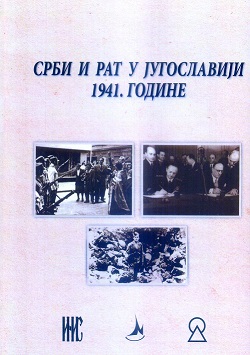Комунистичка партија Југославије и догађаји од 27. марта 1941.
The Communist Party of Yugoslavia and the Events of March 27th, 1941
Author(s): Aleksandar V. Miletić
Subject(s): Political history, International relations/trade, WW II and following years (1940 - 1949), History of Communism, Peace and Conflict Studies
Published by: Institut za noviju istoriju Srbije
Keywords: Communist Party of Yugoslavia (CPY); March 27th; Yugoslavia; USSR; Tripartite agreement; Comintern; war; demonstrations;
Summary/Abstract: The Communist Party of Yugoslavia received the Ribbentrop–Molotov pact with surprise and certain confusion. However, as the disciplined section of the Commintern, the CPY consistently defended the policy of the USSR as the policy of peace, attacking Britain and France as “imperialist” powers who had attacked another “imperialist” power, i.e. Germany. For the Yugoslav communists, it was the “second imperialist war” between capitalist nations, whereas the USSR and Yugoslavia should remain outside of that conflict. The CPY admonished the citizenry and criticized the Yugoslav government for “pro-Western and fawning” policy, warning against “imperialist” agents who wanted to drag the country into the war and consequently championed the policy of relying on the USSR. Yugoslavia’s accession to the Tripartite Pact was criticized by the CPY, but the Party took no part in the coup of March 27th. However, communist members and sympathizers took part in the protests partly spontaneously and partly in an organized way. This spurred the Commintern’s reaction and calming down of the situation. Later on, both in historiography and in official political versions, different views of the events occurred.
Book: Срби и рат у Југославији 1941. године
- Page Range: 231-247
- Page Count: 17
- Publication Year: 2014
- Language: Serbian
- Content File-PDF

